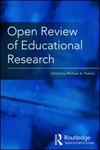Be(com)ing a reflexive researcher: a developmental approach to research methodology
Q1 Arts and Humanities
引用次数: 173
Abstract
ABSTRACT Our purpose in this article is to achieve a shift of focus away from a view of research methods as objectified procedures to be learnt by researchers, and towards the development of researchers who craft procedures integral to the environments in which they operate – environments of which they are also a functioning constituent. A key element in such a perspective is the conceptualisation (and practice) of the relationship between development and reflexivity. Reflexivity involves a process of on-going mutual shaping between researcher and research. Development involves an increase in awareness of such processes of interaction between organism and context. Rather than see development only as a welcome side-effect of reflexive research, we treat development of the researcher as central, with reflexivity in an instrumental relationship to this on-going process. With regard to the pragmatic implementation of these concepts, we emphasise the importance of the researcher consciously stepping back from action in order to theorise what is taking place, and also stepping up to be an active part of that contextualised action. We exemplify the processes involved using research data taken from a doctoral study into the role of technology in the teaching of Arabic. The first section of this article explores the idea of a developmental approach. The second unpacks our sense of reflexivity. The third section exemplifies our discussion through the experiences of a researcher in the field. The concluding section summarises and restates our argument regarding the potential usefulness of adopting a developmental approach to the conduct of research.做一个反射性研究者:研究方法论的发展途径
摘要我们在这篇文章中的目的是将重点从研究方法视为研究人员要学习的对象化程序的观点转移到研究人员的发展上,他们制定的程序与他们所处的环境密不可分——他们也是环境的一个功能组成部分。这种观点的一个关键要素是发展和自反性之间关系的概念化(和实践)。自反性涉及研究者和研究者之间正在进行的相互塑造过程。发展涉及提高对有机体和环境之间相互作用过程的认识。我们并没有将发展仅仅视为反射性研究的一个受欢迎的副作用,而是将研究人员的发展视为中心,反射性与这一正在进行的过程具有工具关系。关于这些概念的务实实施,我们强调研究人员有意识地退出行动的重要性,以便对正在发生的事情进行理论化,并积极参与情境化行动。我们举例说明了使用博士研究中的研究数据来研究技术在阿拉伯语教学中的作用的过程。本文的第一部分探讨了发展方法的概念。第二个打开了我们的反射感。第三部分通过该领域研究人员的经验举例说明我们的讨论。结论部分总结并重申了我们关于采用发展方法进行研究的潜在有用性的论点。
本文章由计算机程序翻译,如有差异,请以英文原文为准。
求助全文
约1分钟内获得全文
求助全文
来源期刊

Open Review of Educational Research
EDUCATION & EDUCATIONAL RESEARCH-
CiteScore
2.60
自引率
0.00%
发文量
0
审稿时长
22 weeks
 求助内容:
求助内容: 应助结果提醒方式:
应助结果提醒方式:


